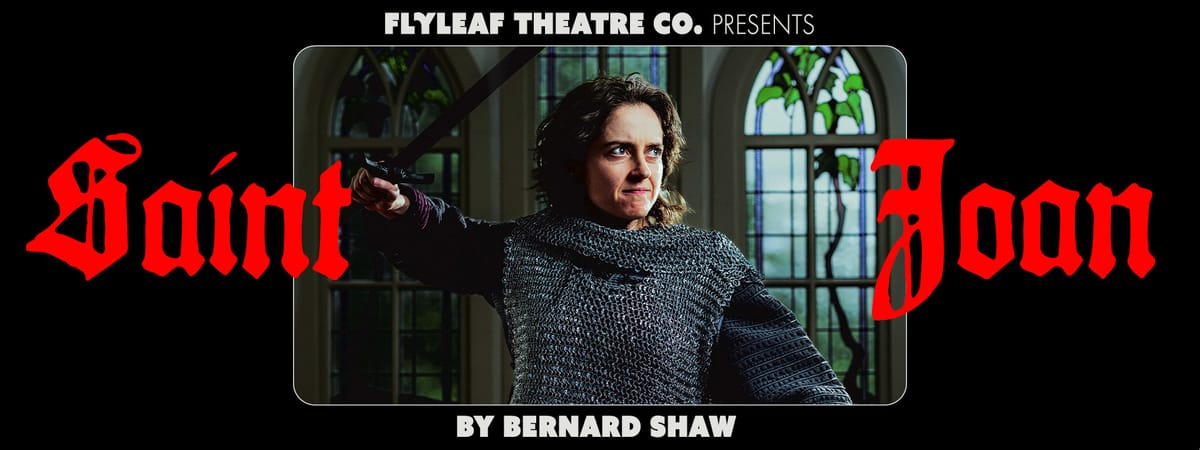She Goes to the Fire: Saint Joan and the Fight for Truth
Bernard Shaw’s Saint Joan comes to Auckland in a bold, stripped-back production. Flyleaf Theatre's Grace Augustine and Aaron Richardson reimagine Joan of Arc’s story as one of resistance, faith, and defiance, with sharp edits, quiet magic, and urgent relevance for today.

For the first time in recent memory, Bernard Shaw’s Saint Joan is being professionally staged for Auckland audiences by Flyleaf Theatre Company, under the direction of Grace Augustine and producer/actor Aaron Richardson.
The pair began researching classic plays last August, drawn to works with both literary depth and political relevance. Titles like The Misanthrope, Metamorphosis, and Three Sisters were considered, but Saint Joan stood out. “It just spoke to us the most,” says Grace, citing Hana-Rawhiti Maipi-Clarke’s tearing of a bill in Parliament as a turning point. “We knew this was the story to tell.”
“Joan is magical,” Grace adds. “She did things we can't explain and is so clear in her vision. I would follow her into battle.”
Shaw’s original script runs nearly four hours, but Grace and Aaron have trimmed it to a sharp 90 minutes. The first cuts were simple, Aaron explains, but the final stage of editing took over two months.
“We didn’t want to make it utilitarian,” the duo explains. “What makes a masterwork are the weird tangents, the imperfections, the neuroses. Like how one of the characters can’t stop obsessing about Joan stealing a horse. That kind of writing is so human.”
The script underwent several iterations, with the team reading drafts aloud to hear what “sounded good out loud – how it sings when it's out in the world.”
Why does Saint Joan still matter today?
“It’s about someone who wants to fight for the freedom of her people and liberate the working class,” Grace and Aaron explain, “but the power structures wouldn’t allow that. It’s about young, powerful people being squashed.”
Joan’s moral clarity and resistance moved both theatre practitioners, particularly in the pivotal scene where she’s offered a way out: deny her visions, call herself a fraud, and live. She almost yields – but doesn’t.
Rather than end with Shaw’s epilogue, Grace and Aaron chose to leave Joan at the stake, holding firm in her truth. “She could’ve saved herself, but she doesn’t. She goes to the fire. And we wanted the audience to sit with that.”
Both the director and producer/actor bring personal depth to the story’s spiritual themes. Raised Catholic, they see Saint Joan as an exploration of belief that exists beyond institutional religion. “It’s about the lived experience of feeling that God exists, even outside the Church,” says Aaron.
As someone who is gender non-conforming, Grace sees Joan’s refusal to fit the mould as deeply meaningful. “She wouldn’t wear women’s clothes. She saw herself as a soldier. As someone who lives outside gender norms, that means a lot.”
That same spirit of defiance and self-definition lingers in every part of the production, alongside the embodiment of a quiet spirituality. Grace describes a moment in rehearsal when something unexpectedly fell from the ceiling. “It felt like Joan was in the room with us,” they say. That sense of presence and magic lingers throughout the show.
Rather than centering the Church, the production turns to nature, including fields, birdsong, and stillness, as symbols of an older, more intuitive faith. It’s a reminder that belief can live beyond hierarchy, in wonder and connection with the world itself.
“These tender moments helped contribute to the show's beauty,” says Grace. “This has been a big moment for both of us as practitioners. Everything has fallen into place in a miraculous way. We feel immense gratitude and joy.”
The team built props by hand – including, impressively, aged, Elizabethan-style books – and worked with the New Zealand Stage and Combat School on historical detail. “Honestly,” Aaron laughs, “we wouldn’t have made custom clothing racks if we knew what a mission that would be. But we did it.”
The production is also a significant milestone for Flyleaf Theatre Company, which the pair hope to grow into a platform for reviving classic texts. “We want to do one classic play annually,” Grace says, “and keep open auditions. This city has so much talent – we want to give those actors a stage.”
Asked what Shaw might make of this radical cut, Aaron jokes, “He’d probably say, ‘It was better in my day.’” But the duo hopes he’d appreciate the care behind their choices.
“Every decision we made, we asked why. What did he mean? What was his reasoning?” says Grace. “Our job as theatre practitioners is to understand the mind of the playwright. I hope he’d recognise that.”
They hope audiences come away seeing Joan not just as a saint, but as a mirror for the present. “Her story reminds us what conviction looks like,” Grace says. “And how dangerous that can be.”
Grace added something quietly powerful as the interview wrapped – in solidarity with all those resisting oppression today: “Free Palestine.”




